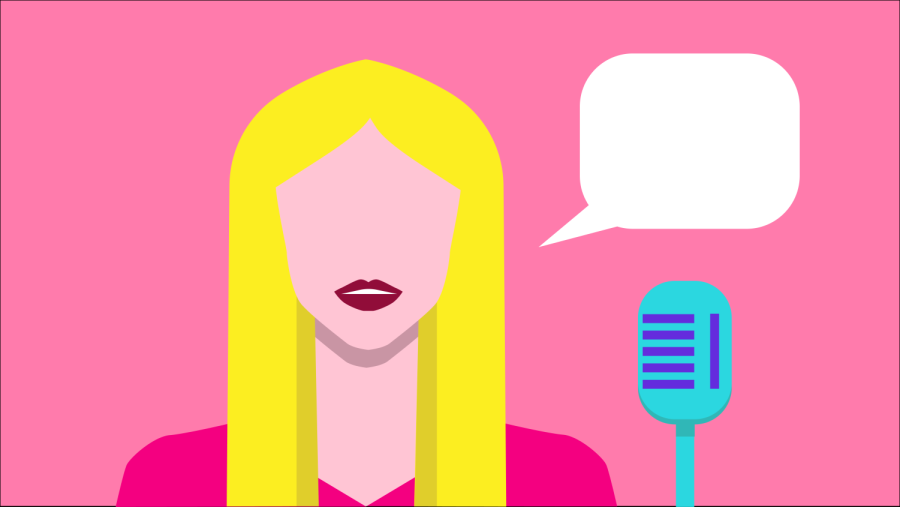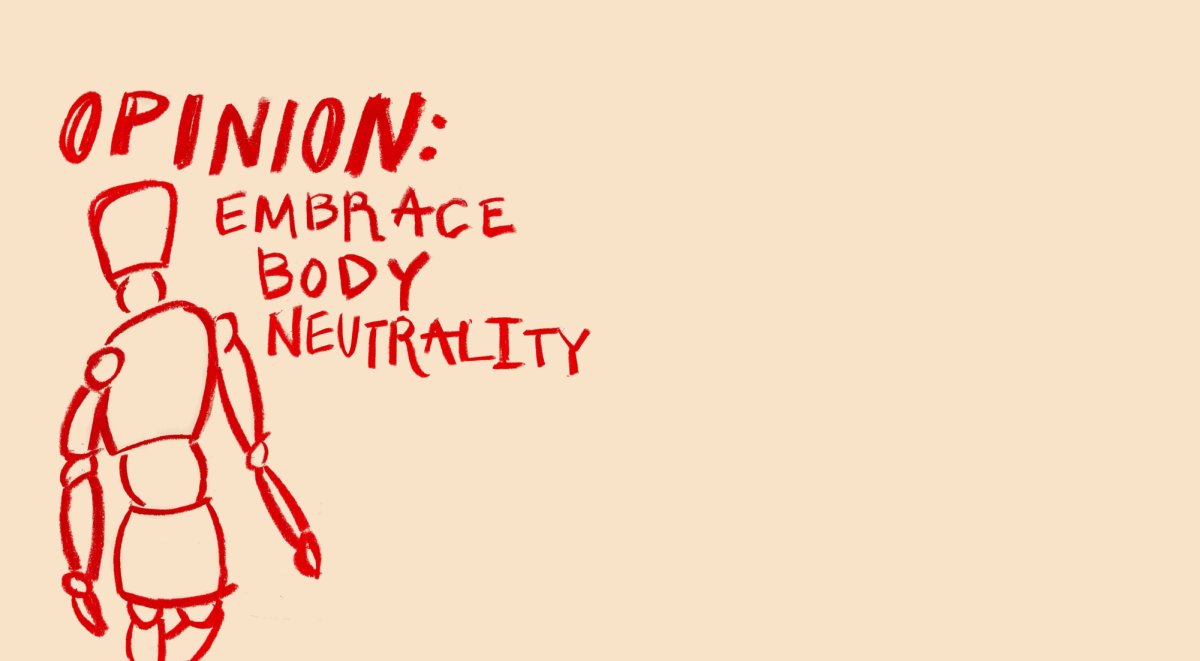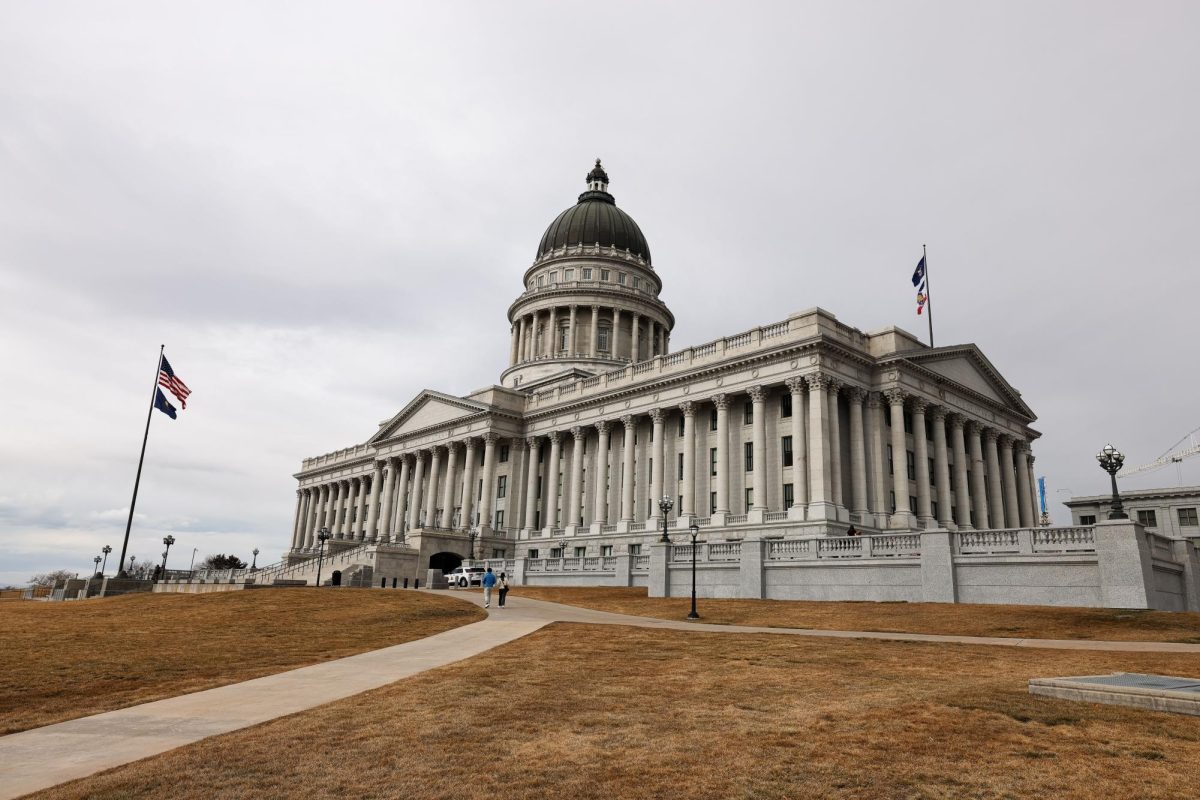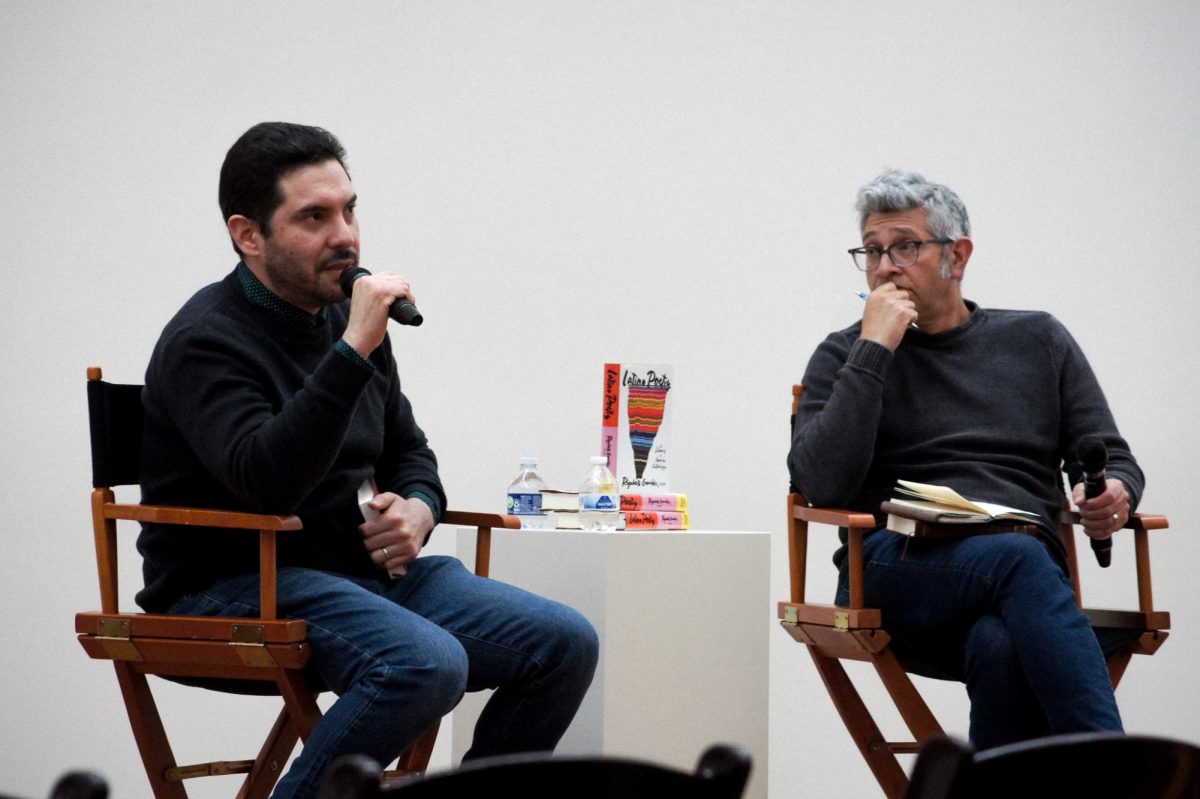Hibben: ‘Call Her Daddy’ is the Opposite of Empowerment
(Graphic by Claire Peterson | The Daily Utah Chronicle)
October 7, 2021
The podcast “Call Her Daddy” has been controversial since its beginning — its hosts, Alexandra Cooper and Sofia Franklyn, frequently use raunchy and explicit language. The podcast discusses sex and relationships in the 21st century and attempts to flip the roles of women and men by putting women in the “daddy” power position.
Cooper said the podcast is “a women’s locker-room conversation that we should be able to have.” While this podcast did start new sex-positive conversations around women discussing their experiences, it continues to appeal to old, misogynistic standards that are anti-feminist.
The Start of “Call Her Daddy”
“Call Her Daddy” started in 2018 as a relationship and sex advice podcast. The hosts used their experiences, such as Cooper’s lack of sexual education, to reduce the stigma around sex.
Cooper struggled with a relationship with a power imbalance, so she gave advice to women to gain control in a similar situation. Franklyn spoke to Time Magazine about the show, saying that their podcast’s advice to “dump him” was often carried out by their fans.
The podcast had 2 million downloads in two months. Barstool Sports bought the podcast, and it became a shining star in the company’s podcast sphere.
However, the podcast broke up after a contract disagreement between Barstool Sports, Franklyn and Cooper, and Cooper acquired a 60 million dollar deal with Spotify to host the podcast by herself.
Troubling Comments
Franklyn and Cooper, while attempting to make a sex-positive space, advised women to use sex as a weapon to control and manipulate men. They suggested gaslighting partners if you were caught cheating, being conscious of your 1-10 “rank” as a woman and using your “rank” to determine how you act around men to get their attention at the right time.
Their conversations around sex don’t talk about women’s pleasure, but rather how to pleasure your male partner to gain control. They constantly discuss how to remain “on top” in a relationship — using sex to “play the game” that men have played for years. They promote the idea that relationships are a constant power struggle, and women need to manipulate, lie and cheat to become powerful like men.
It’s difficult to understand how women can be misogynistic. How could a woman possibly speak against herself? However, our patriarchal society creates internalized misogyny.
It can be as simple as rating yourself from 1-10 or telling other women they need to practice pleasing men if they aren’t conventionally attractive.
The idea that women must be a 10 to be important is sexist. These are misogynistic standards that no empowered woman should hold other women to.
“Call Her Daddy” is filled with internalized misogyny, and it is very clear that these two women are not empowered or free from misogyny at all. It could be a reason why Franklyn and Cooper felt perfectly fine working with Barstool Sports, whose founder Dave Portnoy is notorious for his sexist and racist comments.
Most notably, in 2010 Portnoy posted online, “if you’re a size 6 and you’re wearing skinny jeans you kind of deserve to be raped right.” Franklyn defended her job at Barstool, repeating points that Portnoy said that having women work at Barstool means they aren’t sexist. Just like the podcast, even if women are in a space, it doesn’t mean it’s free from misogyny.
The advice on “Call Her Daddy” is unhealthy and unhelpful. It creates an environment that tells women that their worth is in their sexual abilities, not their minds and souls. Replicating toxic behavior from men is not healthy behavior in life and should not be taught to women seeking advice.
A “New” Vision for “Call Her Daddy”
Today, Cooper has stressed that her new show is pure comedy. She has added guests from different backgrounds that acknowledge other women’s experiences, rather than those of just cisgender white women.
However, Cooper continues to give advice to women on how to be appealing to men. She tries to help women with confidence issues and mental health, but the end goal is always about being attractive or worthy of a man’s attention.
Cooper’s “new” vision is not new at all. It repeats the same message that women need to center every action in their life, down to the perfume they wear, around what men want.
“Call Her Daddy” is clearly not just comedy. The creators know viewers take Cooper’s advice into practice. It is branded as a podcast about women’s empowerment while doing the exact opposite. Cooper is taking advantage of her position as a trustworthy woman to purposely give women toxic, sexist advice.
As a woman, it’s important to be able to feel safe and speak freely and gain perspective on your sex life, just like men.
While I applaud Cooper and Franklyn’s accomplishments in the entertainment world, their success is based on misogynistic culture. This isn’t a show about women taking a stand against men — it’s about appeasing them.
For me, the conversations in “Call Her Daddy” are littered with sexist and misogynistic standards that aren’t funny. Women shouldn’t aim to take the “daddy” position, but instead, should work to eliminate unfair patriarchal power structures.
Even if this podcast is all jokes, comedy can be criticized. Using raunchy language doesn’t equate to a safe space if misogynistic language is still being used.














Nik • Dec 21, 2022 at 9:47 am
I wanted to hate this podcast but this article actually made me like it more. Good job.
Juliana Hathaway • May 27, 2022 at 1:36 pm
Do you guys even listen to call her daddy? Clearly not. If you’re going to write an article about it you can’t just base it off of old episodes from before 2020. Anyone who automatically jumps to the conclusion that Call Her Daddy is a mysoginistic podcast & can’t compete with Joe Rogan should srsly sit and think because your close-mindedness and inability to see how things evolve is what’s wrong with America. CHD is a prime example of how a generation has the ability to grow from
programmed mysoginistic thinkers to
individuals striving to create productive
conversation. it just goes to show what a
little self reflection and education can do for someone. What you are doing is siding with cancel culture. I urge you to listen to her new episodes and be a little open-minded. She’s had some really interesting interviews (i.e. Amanda Knox, Courtney Stodden, etc.) highlighting important issues in society. Until I listened to the episode with Courtney Stodden I had no idea how far we’ve come since just the early 2000s in terms of respecting women. That episode was an eye opener for me. She has also helped change the narrative around mental health. She constantly discusses it and even brings on certified therapists, including the most impressive couple’s therapist who works out of NYC named Orna Guralnik. Before she began discussing mental health, I really didn’t see the benefits of having a therapist or how to even go about talking about mental health. There is so much to get out of the conversations she has with her guests and I really think you should be lifting up this amazing woman who has defied the odds and has broken into a male dominated industry. Everyone evolves and you should really be giving people more of a chance. It’s especially disappointing that you wrote this article after her podcast has changed so much too. What unproductive propaganda this article is. Just be a little more open-minded.
Sarah • Nov 10, 2021 at 11:54 pm
I think you hit the nail on the head. I listened to just one episode today and it rubbed me the wrong way. How it currently has such a large following is beyond me. The host also rages a lot about cancel culture and it reminds me a lot about Donald Trump and the way he handles being criticized.